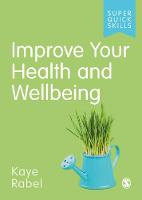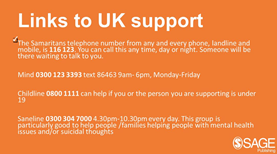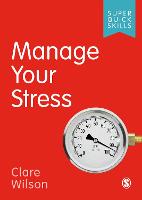Your Wellbeing
Your Wellbeing Matters to us - You Matter
University is exciting, but it can challenge your mental health too.
Having good mental health means you can cope with daily life and manage your stress.

Taking care of your mental wellbeing is for everyone, whether you've ever experienced mental health issues or not.
Looking after your mental health at university will help you to perform at your best during your studies.
Read our tips below to find out how to take care of yourself at university.
What is mental health and why is in important?
Mental health refers to your emotional, psychological and social wellbeing. Your mental health can impact your thoughts, feelings, relationships, physical health, and ability to enjoy life and cope with stress. Your wellbeing impacts how you feel day to day, how you make decisions, and how you respond to situations.
Going to university involves making a lot of changes so it's important to monitor your mental health and build a strong support network so you can look after yourself during your degree. Staying healthy yourself will help you perform your best at uni.

Helping your mental health
There are lots of steps you can take to support your wellbeing and stay mentally fit and healthy - such as making daily lifestyle changes, changing unhealthy situations or accessing professional services.
We all lead busy, fast-paced lives and have lots of commitments - so it's easy to let our mental health slip down our priorities.
Schedule time each day to focus on your mental wellbeing. This could mean 10 minutes of stretching before breakfast, some time reading in the afternoon, a midday walk, or something else.
Consider keeping a journal and writing down what you've done each day to look after yourself so you can see what works well for you.
Take a break. Do an activity you enjoy - listen to music, read a book, bake, get creative.

Do some exercise - dance in your house, go for a run, take up a sport or try swimming.
Spend time to speak to a friend or family member - discuss a new TV show you've found, an upcoming event, or something funny you've read.
Meditate - sit comfortably, close your eyes and focus on your breathing as you empty your mind or think through a problem.
Keep a journal or diary - track your mood, activities, and thoughts by writing them down.
Spend some time alone - take some time to recharge and take a break from other people.
Tips for looking after your physical health
Eat healthily - enjoy fruit snacks and home cooked meals in place of takeaways and sugary snacks. Invite friends over and cook a meal together. Choosing the right foods will help boost your mood and energy, and even help you sleep.
Start the day with a good breakfast and eat regularly throughout the day.
Tip 1.
Drink plenty of water - water will help refresh and hydrate you throughout the day while drinks high in caffeine or alcohol won't.

Monitor your drinks on a night out to make sure you stick to your limits, and drink water before you go to sleep.
Tip 2.
Sleep well - try to get at least 8 hours of uninterrupted sleep a night. This could mean going to bed earlier, turning off your phone overnight, or developing an evening routine. Try not to eat right before you go to bed, as this could wake your body up rather than relaxing.

Tip 3.
Exercise and stay active - exercise is good for short term stress relief as well as your long term wellbeing. Think about joining a society for a regular activity with some new people.
Get outside - go for a walk alone or with a friend to get some fresh air, reconnect with nature and take a break from your home or the library.

Planning Helps
You can help combat symptoms of mental health issues - like losing motivation to do things or feeling helpless - by making plans.
Plan things to look forward to - either for yourself or with friends - and follow through on them. Use these plans to reward yourself for handing in some work, completing revision, or whatever feels right for you.
Sticking to plans gives you control over your time.
Planning your studies and keeping up with your revision can reduce your stress during exam season and around deadlines. Write a study schedule and stick to it. Learn how to build a revision timetable or read more about time management and study skills.
You could also write a daily to-do list, and cross items off when you complete them and look back at your list at the end of the day to see how much you've achieved. Don't worry if you don't cross everything off it - your list is simply a tool to motivate you, and help you identify if you're putting something off.
Improve your Health and wellbeing
Managing your health and wellbeing is super important and really essential. Sage's Super Quick Skills title "Improve your health and wellbeing" gives you the foundations you need to help with the ups and downs or student life.
Contents Include:
What is wellbeing? How can I improve my health with nutrition? How can I improve my health with a balance of exercise and rest? How can I make sure I have a healthy mindset? Why are healthy relationships important? How can I improve the relationships in my life? What does it mean to be connected to something more? What are my personal health and wellbeing goals? What is alignment and how can I incorporate it into my life?
Buy Improve your Health & Wellbeing by Kaye Rabel:
Improve Your Health and Wellbeing - a Super Quick Skills video from SAGE publishing
You're not on your own - Help is on hand

We know sometimes you might not know where to go for support, you're not on your own and there is help out there for you.
Super quick advice
The Super Quick Skills series provides the essential building blocks you need to succeed at university - fast.
Written by experienced SAGE study skills and research methods authors, Super Quick Skills is here to the rescue with tried and tested advice to help you on your university journey.

Author Clare Wilson shares with SAGE Publishing why stress is management an important skill for students to master.
Everyone gets stressed sometimes. Developing a range of techniques that allow you to effectively manage your stress not only enhances your enjoyment of your degree (and helps you to more effectively study), but it will also help you in all areas of your life both now and in the future.
What's the most common mistake students make in this area?
The most common mistake is to believe that your stress is a sign of personal failure, that you should be happier and know what to do. You might believe that other students are not as stressed about their studies, finances, missing home or feeling as lonely as you are. Yet, most students will struggle with stress at some point in their university studies. Stress feels very personal but is a normal reaction to being in new and challenging environments.
What top tip Clare would you give to students wanting to improve how they manage stress?
Ask for help and experiment until you discover what works best for you. Every source of stress at university has been experienced and coped with by thousands of others, so ask them how they coped, and if what they did doesn't work for you, ask someone else. There's absolutely nothing to be ashamed about and everything to be gained by getting help.
Buy Manage your Stress by Clare Wilson:
We are here to listen - your university website has all the information you need for surviving and thriving at university. Check out their counselling and wellbeing service.
Top Tip:
Be kind to yourself

Like physical health, mental wellbeing needs attention.
Good mental health needs maintaining.
Staying active and exercising regularly helps boost your mental health, mood, and concentration.
Make sure to take care of your physical wellbeing as well as your mental health.





